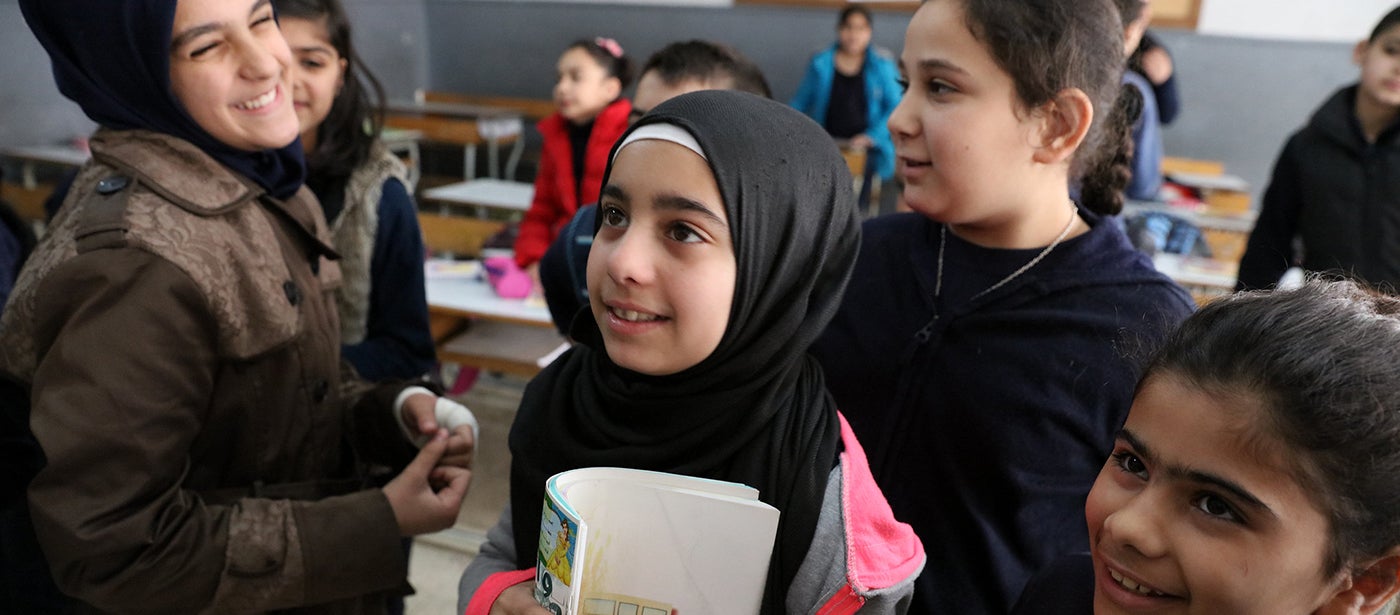 Students listen to their teacher while in class in Beirut, Lebanon. © Dominic Chavez/World Bank
Students listen to their teacher while in class in Beirut, Lebanon. © Dominic Chavez/World Bank
Today, there are more refugees in the world than directly after World War II. That is almost 26 million people who have been forcibly displaced from their homes and fled across borders from situations of fragility, conflict and violence (FCV).
This week, the Global Refugee Forum has highlighted what the global headlines often miss: that 85 percent of all refugees are hosted by developing countries, and three quarters of refugees are still displaced after five years. Such long displacements can be devastating.
All refugees, especially women, are exposed to higher levels of violence and exploitation. Those seeking work often find few opportunities and may be forced to work illegally or in dangerous conditions. A ‘lost generation’ of refugee children may miss out on good health, education and a stable childhood, and are left with few productive skills or job prospects.
Access to jobs, opportunities and long-term health and education for refugees are among the reasons our shareholders are asking the World Bank to get more closely involved in addressing forced displacement. They recognize that development investments can take a long-term approach and complement the immediate humanitarian responses to crises, helping reduce the damaging impact of prolonged displacement. Moreover, this approach is aligned with the needs of host communities in developing countries, many of whom are calling for comprehensive approaches that consider their needs along with those of refugees.
The World Bank has therefore been scaling up its support to refugees and host communities for several years, in response to the growing global crisis of forced displacement. At the Global Refugee Forum this week, I announced that the IDA19 replenishment includes a dedicated window for host-communities and refugees (WHR) of $2.2 billion over the next three years, a further increase compared to the $2 billion allocated under the previous IDA cycle.
While the WHR is the principal source of financing for refugees and host communities in IDA, it is complemented by up to $1 billion from other IDA resources like the dedicated FCV allocation, which was doubled to $14 billion under IDA18. Looking ahead, the new IDA19 package increases this allocation to $18.7 billion in support for countries affected by fragility, conflict, and violence. These countries are also expected to receive a large part of a new $2.5 billion funding window to boost the private sector and create jobs.
Moreover, the World Bank’s Global Concessional Financing Facility (GCFF) that provides concessional financing to middle income countries hosting large numbers of refugees has also ramped up its financing. Grants made to middle income countries have doubled over the same period from $160 million to $320 million.
As well as helping refugees and host communities directly, by addressing the underlying drivers of fragility and conflict the World Bank aims to reduce the factors that can cause people to flee their homes. The IDA19 package will address several areas that are most critical for long-term focus, including:
- Education – because over half of refugees are children, we want to do all we can to prevent a lost generation;
- Jobs – because they are key to self-reliance and dignity, for both host communities and refugees who often live in lagging regions;
- Gender – because of the terrible ordeal many women and girl refugees are going through;
- Prevention and preparedness – because we ought to reduce these crises and better manage them; and
- Data and evidence – because this helps ensure our interventions reach the right people and have the desired outcome. For example, to measure better the impact of refugee inflows on their hosts and inform our responses we have established the Joint Data Center on Forced Displacement with UNHCR.
This expanded focus reflects our commitment to shared responsibility, ensuring that that we are doing our part to support the longer-term needs of refugees. It also reflects a broader recognition at the World Bank that our mission of ending extreme poverty will lead us to implement more operations in situations of fragility, conflict and violence - by 2030, almost half of the extreme poor worldwide are likely to live in these places, and our financing will follow.
The World Bank is already more actively engaged in support of refugees and host communities as part of its development mission. We have already evolved to address conflict and fragility before, during and after crises, and to ensure support and inclusion for the poorest and most vulnerable. Moreover, our support is designed to complement humanitarian efforts and tackle the medium-term economic and social dimensions of the crisis.
Early next year, we expect to finalize our draft World Bank Group strategy for Fragility Conflict and Violence. This will systematize our institutional commitment on FCV through financing, policy dialogue, analytics, operational shifts and partnerships. Our focus on refugees, host communities and vulnerable people in fragile countries is here to stay.


Join the Conversation